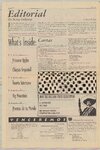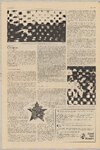| OCR Text |
Show Venceremos 1997 - 7 Jason Hurd the from all across the coun- care and protection supporters try so that they could who travel to Phoenix and testify. This 1s how I found myself just below Big Mountain in the desert of Northern Arizona watching a flock of sheep and contemplating relocation. Relocation is a word that, in our current times, apparently doesn't quite convey all that 1t truly is. Remember Indian relocations from high school “history? Remember the Trail of: Tears? Remember the massacres and devastation, the poverty and starvation pro- duced by U.S. Indian policy? The history of U.S. treatment of the first inhabitants of this land is highly recognized today in most social circles as having been one of complete disregard for the dignity and humanity of entire nations and is usually scorned along with black slavery as the worst blemish on our names. So I found” myself highly perplexed as ] sat under a Juniper tree surrounded by 75 sheep, goats and lambs munching sage brush and strolling around the ridge so casually having no idea that what they were doing was in fact illegal according to the law which says they are trespassing and must be relocated along with hundreds of Dineh resisters and their flocks and all of their belongings to a place in New Mexico called the New Lands where each family who signs up for relocation benefits (Eh? Relocation has no benefits!) will receive a prefab home destined to fall apart as the others there have done, in an area contaminated with radioactivity, joblessness, homelessness, poverty, alcoholism and suicide. Pm perplexed for several reasons. Why, I wonder, have these people been slated for relocation? Who made the decision for these people that they should trade their entire existence and all meaning involved for new lives on the New Lands. And how, I stress, could anyone even consider forced relocation this day and age where many consider themselves to be enlightened as to the forces of racism, sexism, imperialism. and so - On. Hopefully, I thought, these types of questions will be a focus for the hearings in Phoenix. As nave as a hope as that may seem, it is all that is left to believe in. I heard a man speak of how his life has changed with the coming of the fence and the designation of this land and that land, my land and your land, Hopi land and Navajo land. Threatened with confiscation of his livestock he had had to move his sheep further from the fence line to a milder area in terms of harassment. He their sheep stolen by Hopi rangers who claim they are in violation of this and that law. In fact many things have become - ¿llegal. The Dineh can no longer Bury... chew. dead without a permit, collect wood without a permit, conduct sacred cerem on eS without a permit and so on. I heard another man tell me about a disease his - flock has. Their eyes are turning red and swollen and IS spreading among the flock. Many illnesses have been reported among the livestock and the Dineh since the coming of Peabody Coal. Peabody has been in the mid- dle of the push for relocation. They operate a plant not far from where I was staying and live heard that nearer the plant there is always coal dust in the air getting into food, water and noses and lungs. Peabody operates the largest slurry line in the U.S. which uses water from the aquifer beneath the Navajo reservation which has lowered significantly. Peabody is oper-ating its plants illegally but no one seems to be trying to relocate them, just the people liv- ing on top of more coal. The smoke caused by mining in the four corners area is so great that it can be seen from outer space. It almost seems that the only reason to relocate the Dineh to the toxic New Lands is to create the toxic Old lands where the Dineh are now. Its obvious enough to me that the powers that be have absolutely no regard whatsoever for the well being of these people as it stands in the way of profit. Perhaps the questions of relocation will not be considered by the courts, will they be considered by the people? Will relocation be considered justifiable in the name of electricity for TVs and microwaves? Or will we eventually add this story to the list of things that we cannot be held accountable for because it was someone else in the past but we do really feel bad about it? Remember this, we are doing this, we are doing this now and we have been doing it all along. The Indian wars never ended, they only went underground. Relocation is genocide and we all play our part. Obviously, it doesn't have to be this way. February 10 -14th. I had the working to support indigenous struggles im North and South. America. Zapatista posters hang on the walls and chairs are arranged in a circle on the concrete floor, meat cooks over the fire in the backyard. In one corner there is a large rug covered with feathers, shells, drums and bunches of sage. Staffs and rattles lean against the wall. In another corner sits a small desk with a phone, a honor of working with the group Seeds of Peace and cooking food for the Dineh people who came to testify. The issue in controversy was whether or not the Dineh people who inhabited the area for _thousands of years should be. computer and stacks of paper. While Dineh elders chew on mutforced to move to a barren ton and fry bread their lawyers radioactive land to make way for talk about the day's events and mining interests, anxious to what to expect tomorrow. Each get their hands on the coal and uranium rich “sentence is translated into Dineh because many of these people earth. speak little English Beef and mutton The lawyer tells us the judge is for the stew were cutting off hearings tomorrow no sent down from matter how few of the dozens of B 1 g Big Mountain residents have a Mountain, chance to speak. The judge spent where the most of the week listening to Dineh peoPeabody -Coal's lapdogs give ple" sell “their side” of the story, so little live off time is left. These Dineh people the land. have traveled hundreds of miles to Dineh a foreign city, leaving behind women their homes and livestock under tried to the constant threat of harassment teach us by the Hopi Rangers (Hopi tribal how to special police). Their lives are on make fry the line. Their Mother Earth is on bread the line. But the judge has no Around the time. The pretentious colonialist kitchen and asshole has probably already made around the his decision. His loyalty is to big fire at night, money. nobody talked -. The sounds of voices speaking much about the: in Dineh is nice to listen to. I look possibility of forced around me at the posters on the relocation. Maybe it wall and the old Navajo women. l hurt too much to talk feel Pm in the middle of someabout. At times I would sudthing very important, but in my denly find myself choked up, on heart I feel numb. None of the the verge of tears, furious at the fact that this is being allowed to excitement I'm used to feeling at times like this, just numb. To let happen over and over again. myself feel anything would risk Lessons from history never opening the flood gates of pain learned, the Trail of Tears, the and anger. I want to shout and Indian Wars... But this is happenscream at the men responsible, at ing today, 250 Dineh families the nameless faces on the street being driven off their land to whose ignorance and apathy make make way for a fucking coal mine the unimaginable inevitable an to and electric lights for Las Vegas, shout at 504 years of racism and Phoenix, Salt Lake, hair dryers hatred. But all I can do right now and microwave ovens. for these people for this struggle, For the first three days 1 didn't is to pick up the dirty dishes and have the courage to go into town. the garbage and prepare to reload I didn't want to face the issue up the truck. And I look at the faces close and meet the people who of these old Navajos and wonder would be affected and hear their ifI could ever have that kind of story in their own words. Much patience and quiet strength. I'm easier to stay in the kitchen, chop sure that they want to scream and up potatoes and wash pots and shout too. They've been fighting pans. this battle for years, their entire Finally 1 rode into town one lives, and they are still treated as afternoon with the lunch crew. less than human in the white - We set up in a park a short walk man's court of law. from the courthouse while people The struggle continues at Big stood around with their signs and Mountain. The traditional Dineh : banners. While his mother was that live there will not stop fightbusy eating, a small Dineh boy of Jason Hurd ing for their lives because of any three or four years stumbled court decisions. Your support 1s around the park with a sign that badly needed. Write and call your said, “Defend your rights! Repeal elected officials. Urge them to PL-531” (the relocation act). I repeal Public Law 93-531, the smiled to myself and again wantRelocation Act. Volunteers are ed to cry. After all of the Dineh always needed at Big Mountain to people had eaten we rounded up help herd sheep, chop wood, weed some homeless folks to finish off the food and then we drove back - gardens and haul water. to the kitchen with the empty pots. I washed dishes while dinner was finished and then headed back into 6 hd how, i stress, could = anyone even consider forced relocation this day and age where many consider themselves to be enlightened as to the forces ol racism, sexism and imperialism. ? 2 E The Navahos have been fighting this hatl for years, their entire lives, and they are sil treated as:less than human in the white man' court of law. 2 2 Jonathon Hurd town. Dinner was served at Tona-Tierra, a Xicano com- munity center 0 The so called fairness hearings to decide the fate of the lives of 300 Dineh people living on and around Big Mountain, Arizona, were held in Phoenix from NA under came has become very lonely. The sheep are an integral part of the Dineh lifestyle, culture and religion (lifestyle, culture and religion are inseparable in the Dineh way). The sheep provide wool for clothes and traditional tapestries which are sold to help support themselves. They provide food and represent a _limk to the land and ancestors. Many other Dineh have had ral left their land and sheep flocks of resistance Jonathon Hurd 7 This past February a fairness hearing was held in Phoenix, AZ. to examine the situation béhind forced relocation of traditional Dineh (Navajo) in Northern Arizona currently scheduled to begin any time after March 31, 1997. In order to make sure that their story was heard many of the Dineh FUE Relocationis GenOCide... sxecaos 005000450 am Winter |










